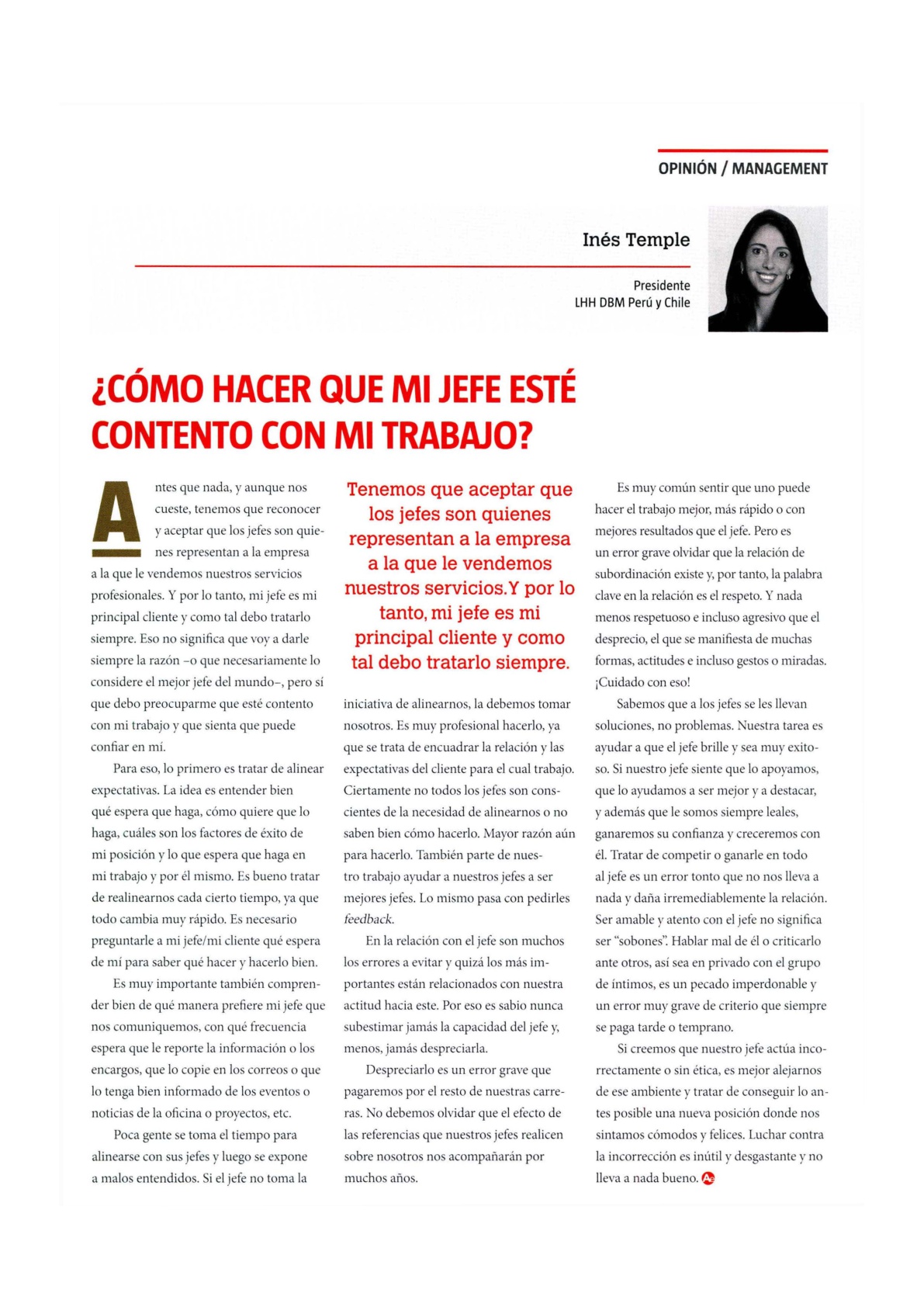Original Spanish version published in America Economia (Latin America) on October 28, 2016
As hard as it may be, we have to recognize and accept that bosses are the people who represent the company to which we sell our professional services. Therefore, my boss is my main client and I should always treat him/her as such. That does not mean that he or she will always be right –or that I necessarily think they are the best bosses in the world– but I need to make sure that they are happy with my work and feel they can rely on me.
To that end, the first thing to do is align expectations. It’s about understanding what they expect you to do, how they want you to do it, what the factors for success in your position are, and what they expect you to do in your work and for him or her. It is good to try to realign ourselves from time to time, because everything changes very quickly. You must ask your boss-client what they expect in order to know what to do and do it well.
It is also very important to fully understand how your boss prefers you to communicate, and how often they want you to report on tasks or information, to copy them in emails, or keep him or her well-informed about work-related events or office news or projects, and the like.
Few people take the time to align themselves with their bosses and later risk misunderstandings. If the boss does not take the initiative to align herself or himself with you, you must take the initiative yourself. Doing so is professional, because it seeks to define your relationship with and the expectations of the client for whom I am working. Indeed, not all bosses are conscious of the need to align themselves with their people or quite know how to go about it –all the more reason for doing so yourself. Helping our bosses be better bosses is also part of our job. The same goes for asking them for feedback.
Regarding your boss, there are many mistakes you should avoid, the most important perhaps being those related to your attitude toward him or her. That is why it is wise to never underestimate your boss’s abilities and, much less, look down on him or her.
Looking down on our boss is a serious mistake for which we will pay for the rest of our careers. We must not forget that the effect of the references given by our bosses will stay with us for many years to come.
It is very common to feel that you can do the job better, faster, or with better results than your boss, but to forget that there is subordinate relationship is a big mistake. The key word in the relationship is respect. There is nothing more disrespectful and even aggressive than disdain, which is expressed in many ways, attitudes, and even gestures or looks. Take care not to fall into that!
We know that we should offer our bosses solutions, not problems. Our job is to help the boss shine and be very successful. If our boss feels we support them, help them be better and stand out, and that we are also loyal, we will gain their confidence and grow with them. Trying to compete with or beat our boss at everything is a silly mistake that leads us nowhere and irreparably damages the relationship. Being nice and attentive with your boss does not mean “kissing up”. Talking badly about them or criticizing them in front of others, even if in private with people you are close with, is an unforgiveable sin and a very critical error in judgment that you will always pay for sooner or later.
If we think that our boss behaves incorrectly or unethically, it is better to distance ourselves from that environment and try to get a new position where we feel comfortable and happy as soon as possible. Fighting against improper conduct is pointless and leads to no good.

The new normal is complex and challenging. Our best positive attitude will be decisive for us to ...
Good leaders seek and create network with other leaders. They know they are responsible for devel...
ncertainty, urgency, or crisis does not give anyone an excuse to be abusive, or act without respe...
Care for yourself by ensuring that you keep stress and workloads at manageable levels. Pass on go...
Original Spanish version published in El Comercio newspaper on April 26, 2020 Whe...
Published in www.ypo.org on September 11, 2020 I am still fascinated by the results of ...
The concerns, motivations, or problems of each team member, as well as the challenges and obstacl...
You are the head of the corporation that is you. Take 30 minutes each quarter to review how much ...
The key is to reframe your attitude so that you don’t fall behind. Recognize your advantages and ...
I continue to work in this and we are making headway, but more respect, empathy, and, sometimes, ...
It’s important to identify our level of employability, recognize its advantages and limitations, ...
Originally published in ceoworld.biz on May 21, 2019 The world of work has changed dramatically, ...
To improve employability, we need to persistently sharpen our work skills and social intelligence...
The challenge is to thoroughly understand our personal reactions to change and immediately focus ...
And yes, we deserve to give ourselves the opportunity to find a job that awakens our enthusiasm a...
Some time ago, I made a mistake, which like all of the mistakes we make, was completely involunta...
Remember that productivity and employability are intrinsically linked –the higher the level of em...
Of course, this is a huge challenge to personal discipline, but we have to appeal to professional...
I want a leader who inspires my respect and admiration for his/her serious, legitimate, and authe...
Original Spanish version published in America Economia (Peru) on September 22, 2016 Ma...
Original Spanish version published in El Comercio newspaper (Peru) on June 11, 2016 “I don’t like...
If you were patient enough to answer these questions and if you made the effort to write the answ...
Original Spanish version published in Aptitus magazine, on May 9, 2018 It is common to see c...
¿Cuántos de nosotros nos sentimos realmente hábiles en las redes? ¿Quién tiene tiempo de calidad ...
What a pleasure it is to help groups of Peruvians to allow themselves to dream and imagine a bett...
When traveling, you remember and compare the experience you had at each hotel where you stayed. ...
The way we answer and the quality of the ideas we express will differentiate us from the others w...
Original Spanish version published in America Economia (Latin America) on March 27, 2018 We ...
Original Spanish version published in El Comercio newspaper (Peru) on March 18, 2018 Twenty-...
Original Spanish version published in El Comercio newspaper (Peru), March 4, 2018 Regardless of t...
Original Spanish version published in El Comercio newspaper (Peru) on February 17, 2018 There are...
Original Spanish version published in El Comercio newspaper (Peru) on January 20, 2018 Hacking, i...
Translation of the original article published December 21, 2017 on América Economía (Latam) Some ...
Original Spanish version published in America Economia (Latin America) on October 23, ...
Original Spanish version published in El Comercio newspaper (Peru) on September 30, 2017 Man...
Original Spanish version published in America Economia (Latin America) on September 2, 2017 There...
Original Spanish version published in El Comercio newspaper (Peru) on July 22, 2017 And when I [&...
Translation of the original article published June 24, 2017 on El Comercio (Perú) Given all the n...
Original Spanish version published in El Comercio newspaper (Peru) on January 4, 2017 We all...
Original Spanish version published in El Comercio newspaper (Peru) on March 4, 2017 As a young [&...
Original Spanish version published in the El Comercio newspaper (Peru) on February 4, 2...
1.Good leaders lead (excuse the redundancy) for the greater good, not to build up their egos, [&h...
Some time ago I wrote about this same subject and was very pleased with the comments […]
Translation of the original article published July 23, 2016 on El Comercio (Perú). Tired of so m...
Original Spanish version published in El Comercio newspaper (Peru) on May 20, 2015 Who wants...
Original Spanish version published in El Comercio newspaper (Peru) on January 1, 2017 Advers...
Being perceived as young or old is now associated more with a series of behaviors and attitudes t...
It’s important to note that our facial expressions, gestures, and posture also send those valuabl...
Original Spanish version published in El Comercio newspaper (Peru) in November 21, 2016 I h...
Original Spanish version published in America Economia (Latin America) on October 28, 2016 As har...


